Utopia
Here's the million-dollar question: What does the term "utopia" mean? Utopian settings are not "everything the real world is not", but something on the horizon that "can be possible". The big idea behind utopian ideas is that they move us and encourage us to research and innovate, so, they challenge what is possible.
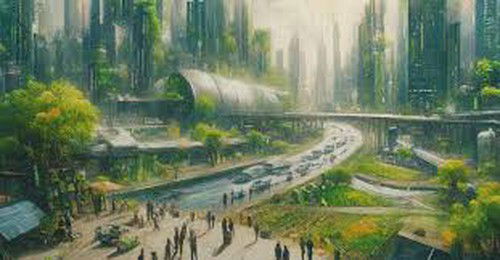
In a not so distant past, long-distance communication, even more one that lets people look at each other, was a utopian technology, something unreachable - but it was a want, and a need. So, what has happened since? Research, technology, and science came into play and made this possible. It is true that we also want flying cards and skateboards and we still don't have them, but it's okay, we just have to wait a bit.
One of the biggest ideas for the future right now is what Artificial Intelligence (IA) and robots can do for us. Futuropia plays with these concepts, but introduces the idea of a self-sustainable setting that we'll have to manage and use to create more free time for humankind.
Let's play our part in Futuropia's utopian future!
Game Info - Futuropia
Futuropia is a board game best played with 1 to 4 players for ages 12 and up by designer Friedemann Friese. It was illustrated by Harald Lieske. It is the direct result of what you get when you combine a game designer with more than 100 successful games under their belt and an artist who beautifully illustrated over 120 games. A hell of a game!

Futuropia was released in 2018 by 2F-Spiele. Its basic mechanic is simulation, so, you'll have to reproduce real events or situations. It is an economy-based game that doesn't rely on luck at all, and, the best of all, it is completely language-independent, that is, you can play it regardless of which language you speak.
One curious fact about Friedemann Friese is that he is known as the "green-hair guy" whose games always start with the letter "F". And there's more: he publishes most of his games with his own company, 2F-Spiele. He might have his quirks, but he is quite the designer!

Let's see the game!
The Game
In Futuropia, people want a place of their own and more free time to do what they want, and there's a lot that they want to do: they want to play sports, chat, read great books, drink wine with friends, plant flowers, listen to music, watch movies, dedicate themselves to art, painting, and sewing, stroll through the square, go to the beach, party on the beachside, dance, or simply rest somewhere nice. However, before they can do all that, they need free time, and no pending commitments. That's when you'll come in!
You'll manage a condominium with many residents and keep it self-sustainable by making people work less and adding robots to do their jobs as much as possible. You'll be greatly rewarded for doing this, don't be mistaken!
Basically, you'll start with a condominium and only, for now, 3 residents, but it is self-sustainable. The place itself, obviously, consumes energy, and people need food. So, your condominium already comes with enough food and energy generators. However, all 3 people are working on these generators, and they don't want to do that.
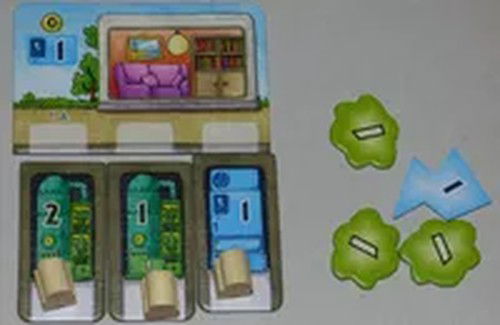
It's up to you to expand this condominium and keep it "running on its own" with robots so you can set your residents free to do whatever they want, as well as whatever your condominium can give them.
As manager, you'll have an initial budget to get bigger, more powerful generators that can produce food and energy more efficiently.
A turn in this game is quite simple. You can basically do 5 different actions, besides one free action:

There's also:
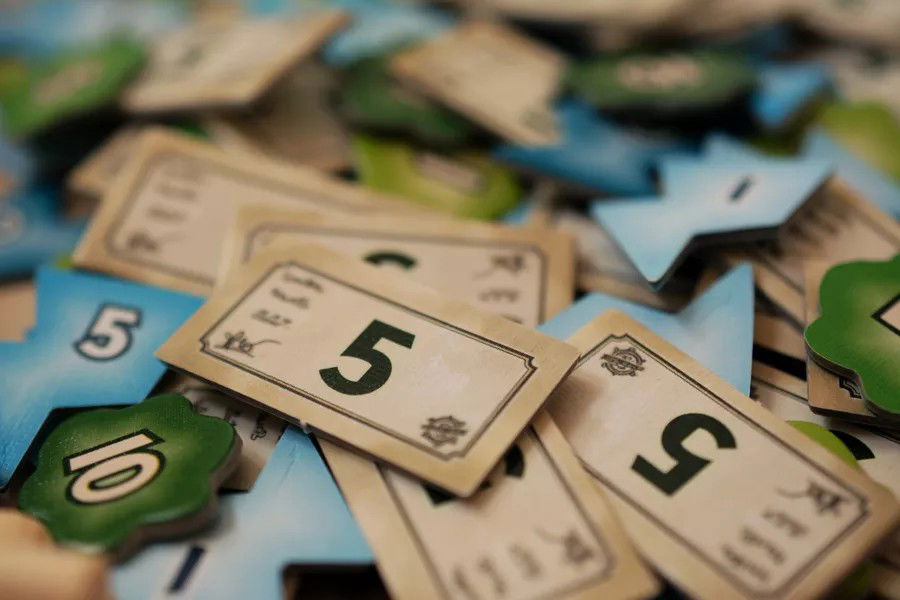
In your turn, you can pick any of the 5 actions above (plus the free action) and do it, it's that simple!
If you decide to Buy a Food Generator or Buy an Energy Generator, you'll buy one of the generators available on the market. The leftmost generator is the cheapest, and the rightmost, obviously, the most expensive. The mechanic of buying generators is the following: their price varies according to how many generators you've bought (more or less expensive).
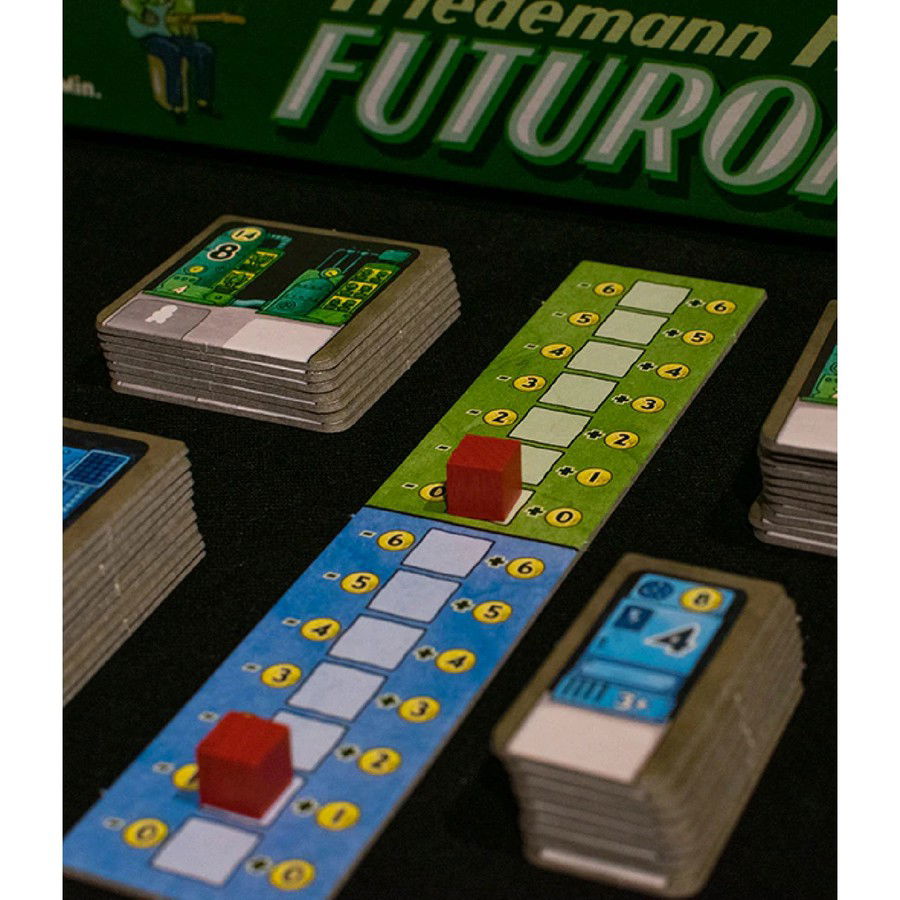
This was a brilliant design decision. What was apparently a simple purchase becomes way more strategic, as the most expensive generators will cost more and the cheapest will be discounted throughout the game as you buy them. Managing this mechanic makes the game a lot more competitive and fun.
Another brilliant detail is that, when you buy food or energy generators, you'll place them on your condominium and automatically test run them. So, you'll assign people (or robots, in the future) to them and get it running. That's why it is important to have people (or robots) in your condominium. And here's a golden rule: produce before you consume!
If you decide to Invite People to your condominium, it will be great, but you must have enough space for them. Particularly because when they're resting, so, when they're not working on the generators, they'll give you lots of points for your final score.
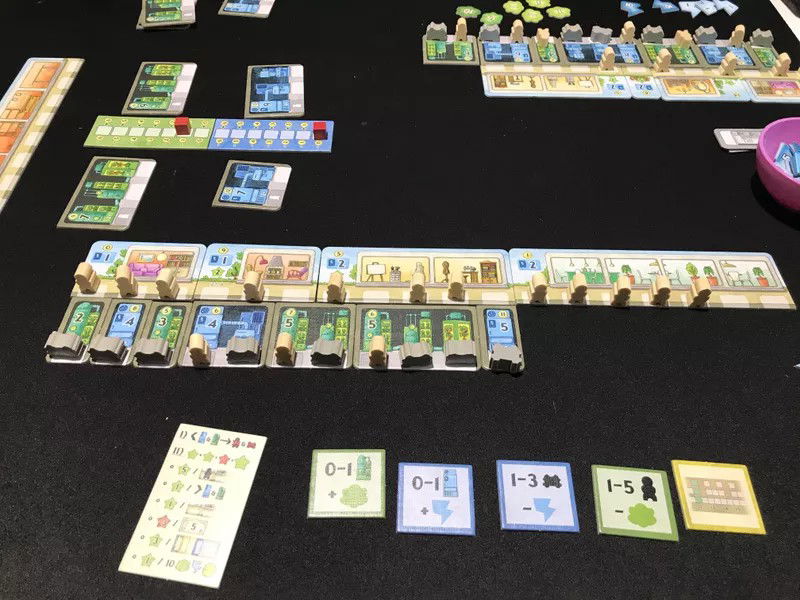
However, before you invite people to your condominium, you need enough food to feed them. You'll have to test run food consumption, so, you'll need to check if you already have enough food for everyone. If you don't, you'll have to pay for it with your money. When you invite people to your condominium, you'll also be able to expand it. This means you'll get new living spaces and, with these spaces, more areas to put these people and these generators if you need to.
If you decide to Take Robots, which, by the way, is essential, you'll bring robots to your condominium to work and do the job a human was doing before. At this point, you'll be doing exactly what the game wants: setting humans free to do whatever they like.
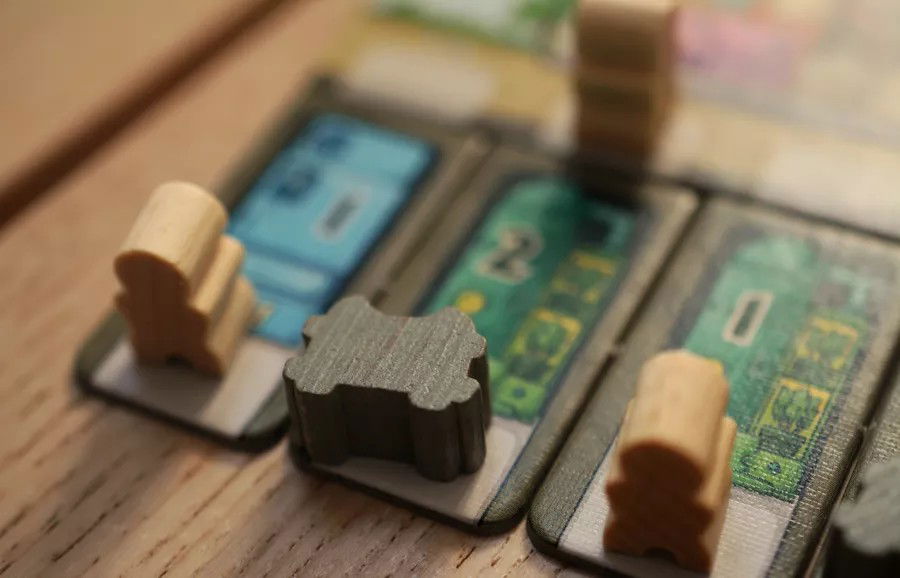
However, you'll need to test run your condominium's total energy consumption first. This includes how much energy your humans consume, and how much energy your robots consume. Once again, if you don't have enough energy, just like when you test run your food consumption, you'll have to make up for it with money.
As you must have realized, you'll have to use money often, either to buy generators, new spaces for your condominium, or to pay whenever you don't have enough food or energy.
So where does this money come from? From the subsidies the government gives you to keep your condominium self-sustainable.
To get a certain amount of money for your project from the government, just Take a Subsidy. This amount will vary, but it's always more than before, so it will help you keep going.
And if you still need money afterward, you can use your Free Action, which is nothing more nothing less than taking a loan or more. This will be great if you want to take advantage of any opportunities that arise in the generator market. Keep an eye on it because if you don't pay in time, you'll have to pay extra fees, and if you don't pay the fees at the end of the game, it may cost you precious points.
Well, after you pick which of the five actions you'll do, you'll turn it face down, and it will be unavailable until you use all five actions. Then, they'll be available again. Or, if you really have to, you can pay to make one of them (or more than one) available again. After that, it is your opponent's turn to play.
That's basically how you play Futuropia!
End of the Match
Remember these two concepts: how to trigger the end of the match, and how to calculate your score. You'll do each of these tasks at different times. Let's go!
The match will end when either of these two things happen:
or
Notice that these are "just" ways to trigger the end of the match, and not the end of the match itself. After either of the two things above happen, all players must turn their 5 action tiles face up without paying anything. The action that triggered the end of the match can't be used after this by their player, and, more importantly, players don't need to pay any extra fees they might have, but they also can't pay what they must. They'll carry that debt forward.
From then on, if they'd like to, everyone can use each action that they turned face up one more time, and turn them face down as they use them. After everyone finishes playing, they are removed from the game. Please note that any actions you don't use (turned face up) will give you more points. This might be the difference between winning or losing, so be careful!
Now, after everyone is removed from the game, you must pay your loan fees one last time. Next, you must pay for as many of your loans as you can because any loans you still have after this step will make you lose points.
Finally, before you calculate your score, you'll need to check if your generators can make enough food and energy to feed your residents and keep the condominium and the robots working. Otherwise, kick out your residents until you can make enough food with your food generators, and kick out robots until you can make enough energy with your energy generators.
Here's a helpful guide included in the game box to help you calculate your score:
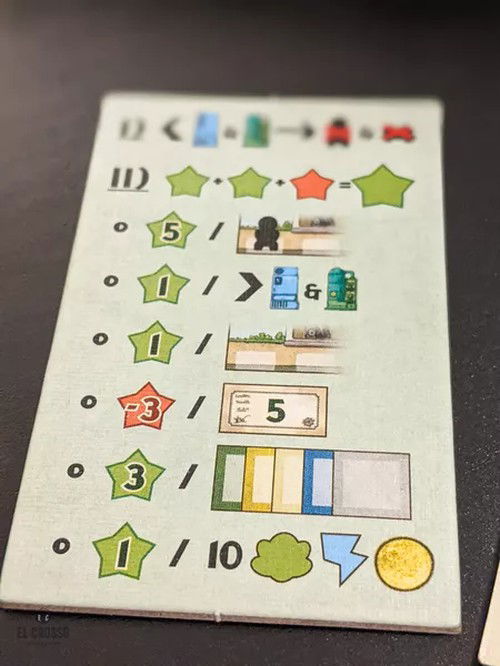
Calculate your score like this (positive and negative points):
Whoever has more points wins! If there is a tie, the Nations of the World sigh with relief, as you will not have the sole monopoly of this business!
It's that simple!
Strategies and Tips
Futuropia leans heavily on economic systems, so be ready to work with many numbers.
Use your money wisely. Knowing which generator to get and when to get it is essential because their prices will vary. This means expensive generators will get more expensive as you buy them, and the cheap generators will get cheaper.
The fact that the expensive generators will get more expensive is great, in a way, because it will make your opponent's lives harder, but, on the other side, cheap generators will be even cheaper. This doesn't mean the market for cheap generators will be popular, as they'll be cheap for a simple reason: they produce less and need more people or robots to work, so they're not that efficient.
Depleting the pile of cheap generators will also change the market, as the next cheap generators that enter the market will be priced normally, without any discounts, and the most expensive generators will also cost what they cost before as well. It will all return to "normal". The most expensive generators won't be more expensive, and the cheaper generators won't be cheaper.
So, knowing what and when to buy makes all the difference in the world.
Inviting people to your condominium is essential because it is the main way you'll get points in the game, but you need enough space for them to live in. This means you can (and need to, at times) to get new living spaces for your condominium. These spaces may or may not give you points, and, please note that they can also force you to subtract points. Pay attention to that!
And there's more: whenever you invite people to your condominium, you'll need to have enough food already available to feed these people. Otherwise, you'll have to pay for the lack of food with cash.
You can also have only up to 5 unoccupied living spaces in the living quarters of your condominium. If you have more than 5, it is considered a waste, and you'll be breaking the game's rules, so you'll have to manage this as well.
Taking robots follows the same logic as inviting people, as they'll be responsible for letting people rest and give you points at the end of the game. However, you'll also need to calculate how much energy you consume, so, you'll add the energy the living spaces in your condominium consume and how much your robots consume - that's what you need to produce with your generators before you get any robots. Otherwise, you'll have to pay for the lack of energy with cash.
In both cases, there's a limit: you can only invite 1 to 5 people at a time, and you can only get 1 to 3 robots at a time. You must keep in this mind whenever you invite people or take robots to your condominium.
Getting subsidies from the government is easy, but, as I played, I noticed that this is a clear indication that you'll "buy generators" soon, as, obviously, you're taking a subsidy to get a generator. You'll rarely use a government subsidy to expand your condominium and add more living spaces, even more considering this costs way less. And what does that mean? Whenever you get subsidies, you'll be kickstarting a race to get the most efficient, cheaper generators before the market fluctuates. This is a fact! It happened in all matches I played.
Honestly, I don't really see how you can play around this. Considering each time someone takes a subsidy their value goes up, you'll often find yourself in a dilemma: you can not get any subsidies to not increase their value and benefit the next player, but you need the subsidies to get generators. It is complicated! At this time, I highly recommend you "read the room", that is, look at how your opponents are playing and decide what is the best time to get subsidies.
As for loans, I don't recommend you get any, truly. I know it's tempting in a few cases, particularly when you have the opportunity to get a cheap generator, but remember the extra fees you'll have to pay. It's just inefficient. Now here's a fact: not using any loans, which actually speeds up the game, obviously will make the game slower. The game will take longer because the only way you'll get money will be exclusively from a government subsidy.
Now, if you want to turn your action tales face up beforehand with money (which is something you can do for free after you use all 5 actions), you'll need a proper strategy. This way, you'll be able to get subsidies faster, but, obviously, you'll need to pay to unlock this action again, and then pay loan fees again because you'll be "reactivating" tiles beforehand. Use this strategy wisely.
And finally, in terms of using your action tiles or not when the end of the match triggers, you'll need to do some math to decide. If you don't use them, they'll give you precious points that might be the difference between winning and losing. If you can, obviously, don't use them. I only truly recommend you do if using them will give you more points than not using them. It's that simple!
Follow these tips, make your condominium self-sustainable, and increase the quality of life of your residents in Futuropia!
Unboxing, Rules, and Gameplay Videos
Check out this unboxing:
Learn the rules:
Watch some gameplay:
Teaching Moments
If you want to work on your math, management, or economy skills, Futuropia is the perfect game for you!
The entire game is a lesson in resource management and math, as you'll need to calculate everything - from food, to energy, to living spaces, and much more.
You'll also need to manage, at all times (truly, at all times), how much money you have, so you can get living spaces and generators. Then you'll have to count how many residents you have to feed them, how many robots you have, and how much energy the entire condominium consumes, then calculate how much energy you produce, as well as food, before every action.
In theory, if you do your actions before you calculate these numbers, you'll most definitely make mistakes. In Futuropia (and in life), that's a fact!
You can't play Futuropia without calculating these numbers, managing your economy, and keeping an eye on the market. This game will highly punish you if you don't, so there is simply no way to play it without these skills! Your condominium will stagnate if you don't calculate these numbers before you do your actions; you might not even be able to play your actions, in fact. This is great because you'll learn that, if you don't think things through, you'll simply not be able to do them at all. You can't force your way through. It is quite a lesson!
Working on your economic skills while looking at the future is what Futuropia does best, in a very fun way as well.
In Futuropia, the rule of the game is: produce before and consume later, which is a tale as old as time in economics!
I highly recommend Futuropia for your collection!!!









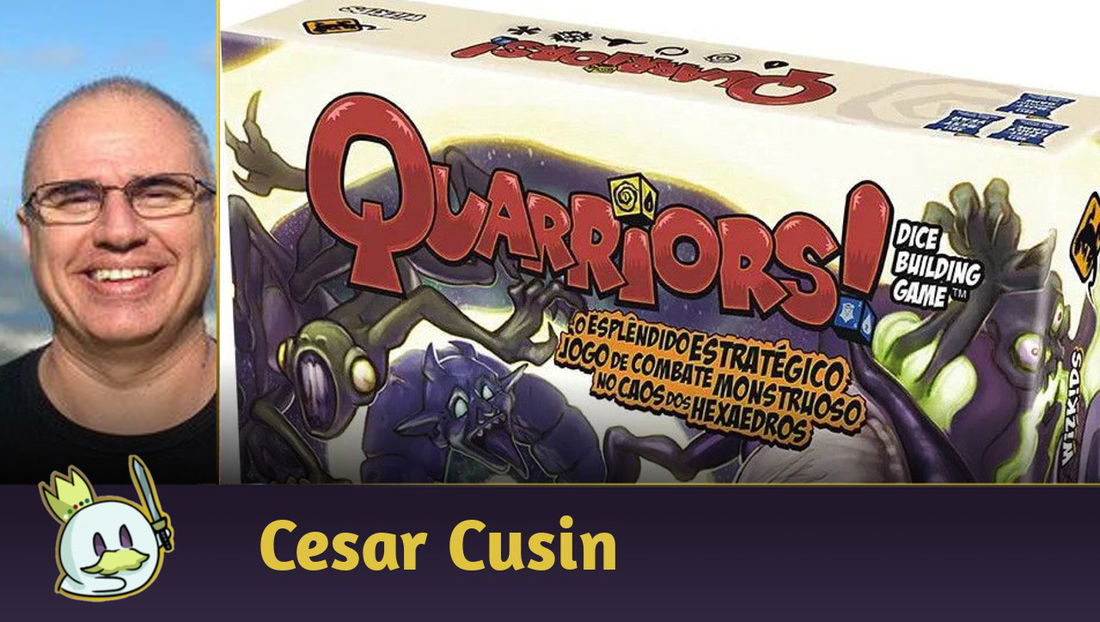
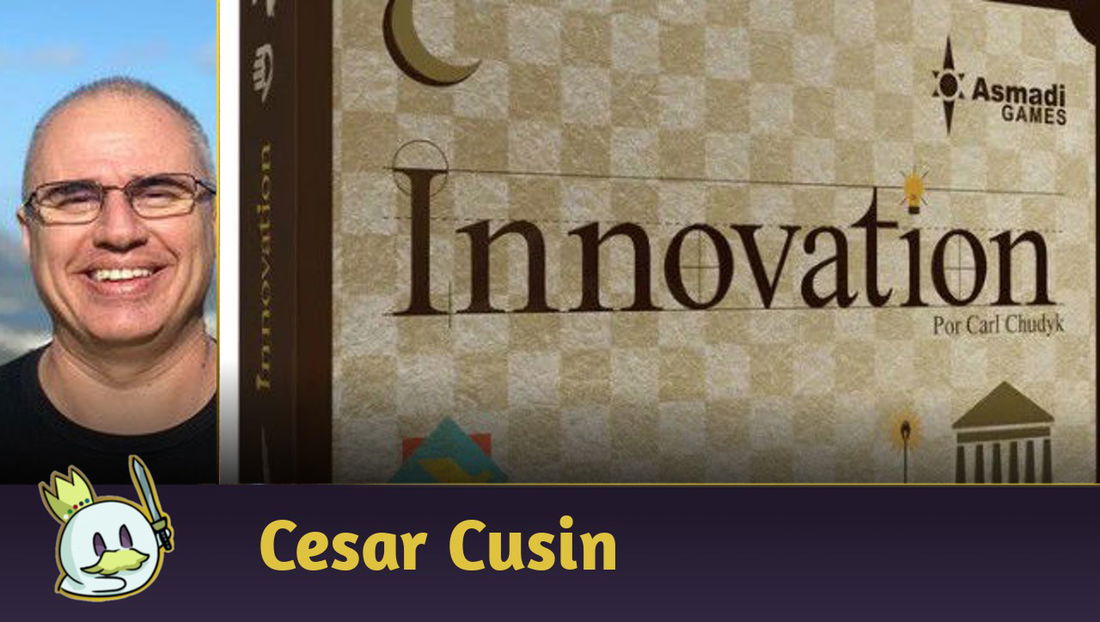



— commentaires 0
, Réactions 1
Soyez le premier à commenter